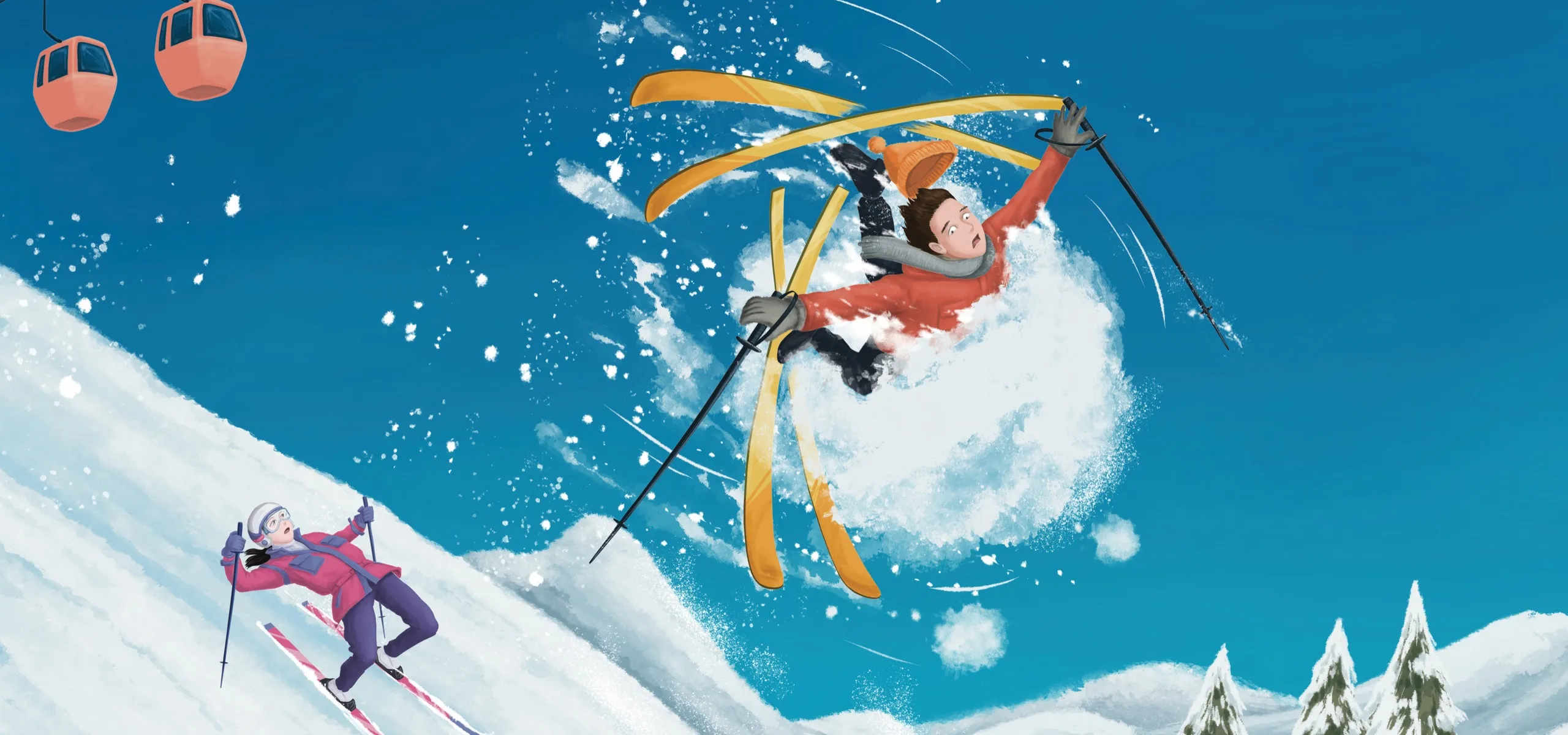A Winter Olympics-ready linguistic guide to visiting China’s ski resorts
As the 2022 Winter Olympics rolls around, enthusiasm for snow sports in China is running higher than ever. As mainstream Chinese media is fond of declaring, “北京冬奥会带火了中国的冰雪运动 (Běijīng Dōng’àohuì dàihuǒle Zhōngguó de bīngxuě yùndòng, The Beijing Winter Olympics has ignited the popularity of snow sports in China).”
According to the “2021 China Ice and Snow Tourism Development Report” from the China Tourism Academy, published in January, winter sports are expected to attract 230 million visitors this year and generate revenue of more than 390 billion RMB, almost reaching the government’s goal of engaging 300 million people in the sport by 2022.
Outdoor and indoor ski venues have opened across the country in response to these investments, inviting visitors with attractive slogans:
Badaling Ski Resort is calling you to ski.
八达岭滑雪场在喊你滑雪啦。
Who can deny the charm of ice sports?
谁能拒绝冰雪运动的魅力?
No matter your skiing level, there’s an inevitable adrenaline rush as you fly down snowcapped mountains and make quick turns through white powder snow. Try it once, and it’s fairly easy to go down the rabbit hole—literally “入坑 (rùkēng, ‘fall down the hole,’ get obsessed)”—of season passes, ski lessons, expensive gear, weekend trips to the slopes (or even renting an apartment nearby), and all the trappings that come with a passion for snow sports.
In addition to this, it’s essential to learn some vocabulary and slang (黑话 hēihuà) that China’s ski community has developed over the years, so you can present yourself as a true aficionado on the slopes—even if all you’re doing is falling.
Pack and prepare
Before sliding down the snow-covered trails, prepare your equipment. A full set of helmet, goggles, poles, ski jacket, boots, protective gear to minimize injury, lift tickets, and transportation can make you realize just how “cash-burning (烧钱 shāoqián)” your new hobby is:
The cult of snow is as deep as the ocean. From now on your wallet will always be empty.
一入雪门深似海,从此钱包是路人。
One sight that never fails to astonish first-time visitors on Chinese slopes is that of beginner skiers gliding with colorful plush toys strapped to their backsides to protect against falls (giving a whole new meaning to the term “bunny slope”). Just grab one at any ski resort in China and recommend to your beginner friends:
The classic turtle toy set will make you feel much safer.
经典的小乌龟套餐,让你安全感爆棚。
Mastering the movement
Before you head for the piste, you need to learn some basic skills. Beginner downhill skiers usually start with the “snowplow (犁式 líshì)” position with the skis pointed inward to control their speed, while novice snowboarders achieve the same effect with the “sideslip,” known as “推坡 (tuīpō, slope-pushing)” in Chinese, by putting their board perpendicular to the slope and digging into the snow with the edge of the board.
Some people, though, never get past these basic positions. They become known as “推坡小王子/公主 (tuīpō xiǎo wángzǐ/gōngzhǔ, side-slipping princes or princesses)” who glide along at a snail’s pace for life:
I just want to stay on the beginner slopes and be a side-slipping prince for a while.
我就想安安静静待在初级赛道,先当一阵子的推坡小王子。
Those who master the snowplow can move on to bigger challenges, such as bumps or moguls, transliterated into Chinese as “蘑菇 (mógu, mushroom).” Skiing over moguls is known as “猫跳 (māotiào, cat jumping).” Natural moguls are called “wild mushrooms (野蘑菇 yěmógu),” but many ski areas construct them on purpose for advanced skiers to refine their skills or for novices to gain an unnerving experience.
Don’t panic when you see natural moguls. Just slide around them and enjoy the thrill.
看见野蘑菇不要怕,滑起来,好刺激的。
As you approach the bump, your instructor might tell you it’s best to find the best track over it, rather than simply sliding into it:
The key to mogul skiing is controlling your speed and finding the best route.
猫跳最关键的是控制速度找最佳路线。
Slope etiquette
Skiing education is more than just learning the basic skills. On crowded slopes, proper etiquette and observing right-of-way is essential to a pleasant and safe skiing experience, even if it seems like most skiers in China’s popular snow resorts don’t share that opinion.
One common enemy of skiers, novices and pros alike, are those who have no concept of control and refuse to stay in their own lane. When someone suddenly cuts in and nearly crashes into you with no warning, you have encountered the infamous “鱼雷 (yúléi, torpedo),” the Chinese nickname for trail-cutters:
I hate those torpedoes that charge around randomly.
我最讨厌那些横冲直撞的鱼雷了。
Dealing with injury
“Torpedoes” are not just annoying, but can pose a serious danger to skiers. Skiing can also come with the risk of other accidents and even fatal injuries for those without proper training and equipment, or who wander away from designated trails without preparation.
Ski-enthusiasts, though, are not deterred by the dangers—some, in fact, seem to be drawn to the sport by them—and often mock themselves for it by claiming to be “sponsored by Jishuitan (积水潭赞助 jīshuǐtán zànzhù),” a Beijing hospital renowned for its orthopedics; or if they prefer Chinese medicine, as “VIPs of the bone-setting hospital (正骨医院VIP zhènggǔ yīyuàn VIP)”:
I’m a skier sponsored by Jishuitan Hospital. The most famous orthopedic doctors in Beijing are waiting for me.
我乃积水潭赞助滑手,北京知名骨科医生在等着我呢。
Falling can be demoralizing, and a beginner who has tried and failed too many times might quip that they and their skis or snowboard have “incompatible auras (气场不合 qìchǎng bùhé)”:
My snowboard has a mind of its own.
我的滑雪板有自己的想法。
Still, any instructor will tell you that falling is just part of learning, so pick yourself up and get back on the slopes:
Even if I break my leg, I will learn to ski.
哪怕摔骨折了,我要把滑雪学会。
Social minefield
Skiing is also a social activity, allowing you to make many like-minded friends. It can sometimes seem, though, that you and your new ski buddies have a “seasonal friendship (季节性友谊 jìjiéxìng yǒuyì)” that doesn’t extend beyond the slopes:
We never contact each other in any other season, but when winter comes we naturally resume our artificial skiing friendship.
我们是一年四季中春夏秋都不联系,到了冬天就自然而然熟悉起来的塑料滑雪情谊。
Still, while the friendships last, it’s nice to have a group you can eat noodles with, on and off the slope—“面条雪 (miàntiáoxuě, noodle snow)” is ski slang for snow that has been compacted by trail grooming vehicles so that it is flat, but with shallow grooves running along the surface:
Let’s go and eat some noodles.
走走走,吃面条儿去。
But not all interactions between skiers are friendly. Like in other countries, Chinese snow-enthusiasts are divided into two camps: snowboarders, and downhill skiers. Because most beginners start on two skis, some boarders feel their version of the sport is superior, and insult downhill skiers by comparing their skis to chopsticks:
Go away, don’t stab me with your chopsticks.
走开,别拿你筷子戳我。
A downhill skier might fire back:
Skiing is easier to learn, but hard to master.
双板滑雪虽然容易一些,但是不容易学精。
Call it a day
The painful tumbles, the cold, the wet clothes, and the risk of injury can demotivate some beginners, causing them to give up skiing after a few tries.
Still, for those who stick with it long enough to get good—or just don’t mind constantly falling—learning to ski can be a wonderful experience. They may find themselves “brushing the trail (刷道 shuādào),” going up the slopes again and again, because they are having so much fun:
Skiing is cool, and if you keep skiing, it keeps on being cool.
滑雪一时爽,一直滑雪一直爽。
Slope Slang: Talk Like a Skier is a story from our issue, “Access Wanted.” To read the entire issue, become a subscriber and receive the full magazine.












